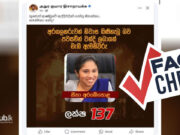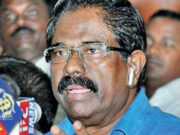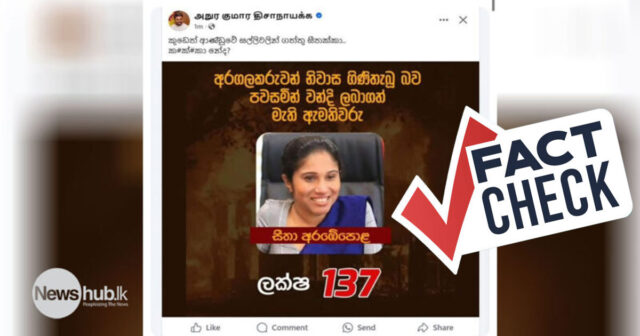The Controversy Surrounding a Sri Lankan Presidential Post
In the fast-paced world of digital misinformation, fact-checkers play a crucial role in ensuring accuracy. But what happens when a fact-checking organization itself is accused of getting the
facts wrong?
A recent controversy surrounding Sri Lanka’s President Anura Kumara Dissanayake’s official Tamil Facebook page has sparked serious concerns about the credibility of Facebook’s third-party fact-checking in the country.
The Disappearing Post and the Whistleblower
Recently, Nirosh Niro, a journalist from the Tamil Mirror newspaper, claimed that an improper post was published on the official Tamil Facebook page of President Anura Kumara Dissanayake (https://web.facebook.com/AnuraKumaraTamil) and was quickly deleted, raising questions about its content. Before its removal, he took a screenshot
(https://web.facebook.com/share/p/15vYTxguKp/) and shared it with another journalist, Nirosh Maithree.
Acting as a whistleblower, Maithree published the screenshot on his Facebook page, alleging that the President’s Tamil page had posted something inappropriate and later deleted it.
Fact Crescendo Sri Lanka’s Intervention
Soon after, Fact Crescendo Sri Lanka—a third-party fact-checking organization for Sinhala content on Facebook—published a fact-check (Archived post – now changed: https://archive.org/embed/evidence-1-archive-version-of-the-original-article-published-by-fact-crescendo-sri-lanka), labeling Maithree’s post as misleading.
Their claim? That the original screenshot was photoshopped and had never appeared on the President’s Tamil Facebook page. This conclusion led Facebook to flag the journalist’s post with a false information warning, reducing its visibility and preventing it from being widely shared.
The Problem: A Flawed Fact-Check?
The controversy deepened when evidence surfaced proving that the original post had indeed been published on the President’s Tamil Facebook page before being deleted. This revelation cast serious doubt on Fact Crescendo Sri Lanka’s initial conclusion.
Acknowledging the discrepancy, Fact Crescendo Sri Lanka later admitted that they were seeking additional activity logs from the President’s page to reassess their fact-check.
Breach of Fact-Checking Ethics?
As a signatory of the International Fact-Checking Network (IFCN), Fact Crescendo Sri Lanka is bound by strict principles of non-partisanship, transparency, and accuracy (Source). However, their handling of this incident raises serious concerns:
- Did Fact Crescendo Sri Lanka rush to a conclusion without fully verifying the evidence?
- Did their premature fact-check influence Facebook’s decision to suppress the journalist’s post?
- Does this incident indicate a bias toward protecting the government from criticism?
The Bigger Picture
This controversy highlights a growing issue: Who fact-checks the fact-checkers? When an organization tasked with upholding the truth fails in its responsibility, it can inadvertently contribute to misinformation rather than combating it.
As Fact Crescendo Sri Lanka re-evaluates its fact-check, the damage has already been done. The journalist’s credibility was questioned, the flagged post lost its reach, and public perception was shaped by an incorrect ruling. If such errors go unchecked, they threaten the very foundation of fact-checking as a tool for accountability.
Final Thoughts
This incident serves as a reminder that fact-checking must be held to the highest standards. If IFCN signatories fail to maintain accuracy, their credibility—and the trust of the public—will erode.
Moving forward, there needs to be greater accountability, transparency, and oversight in the fact-checking process to prevent similar mishaps.
The question remains: Will Fact Crescendo Sri Lanka take full responsibility for this error, or will it attempt to quietly revise its findings without addressing the consequences of its initial mistake?
By Sandun Arosha Fernando



































